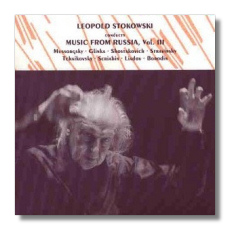
The Internet's Premier Classical Music Source
Related Links
- Latest Reviews
- More Reviews
-
By Composer
-
Collections
DVD & Blu-ray
Books
Concert Reviews
Articles/Interviews
Software
Audio
Search Amazon
Recommended Links
Site News
 CD Review
CD Review
Leopold Stokowski

Music From Russia, Volume III
- Modest Mussorgsky: Symphonic Picture "Night on Bald Mountain" (1867)
- Mikhail Glinka: Fantasy on Two Russian Chansons "Kamarinskaya" (1848)
- Dmitri Shostakovich: Prélude in E Flat Major (orch. Stokowski)
- Igor Stravinsky: Pastorale (orch. Stokowski)
- Piotr Ilyitch Tchaikovsky: "1812" Overture in E Flat Major, Op. 49 (1880)
- Alexander Scriabin: Symphony #4 "Poem of Ecstasy" Op. 54 (1908)
- Anatol Liadov: Eight Russian Folk Songs (four excerpts)
- Alexander Borodin: Prince Igor: "Polovetsian Dances" (1887)
Royal Philharmonic Orchestra/Leopold Stokowski
Music & Arts 847 (Koch) 73min
The eternally youthful 87-year-old Leopold Stokowski was at the top of his form for this remarkable concert on June 15, 1969. The highlight of that occasion was clearly Stokowski's orgiastic interpretation of Scriabin's Poem of Ecstasy. Even the composer's one-time friend and early champion Serge Koussevitzky was never able to match the exotic colors, irrepressible energy, and sexual tension found here. Stokowski himself made at least two commercial recordings of this work in the stereo era (first with the Houston Symphony for Everest and later a London "Phase Four" LP with Czech Philharmonic), but neither one can match the organic unity and sheer eroticism of this concert performance.
Other memorable moments include an apocalyptic Shostakovich Prélude (in Stokowski's own, for once thoroughly idiomatic transcription) and a group of four utterly charming Russian folk songs settings by Liadov. The conductor's hopelessly gaudy transcription of Night on Bald Mountain has always struck me as unintentionally comic. Had it been performed at the Hoffnung Festival, I'm convinced that it would have had the audience rolling in the aisles. This performance has even more fire and brimstone than usual. Not everyone in the Royal Philharmonic could keep up with the maestro's frenetic tempos, thus there's some ragged playing in Kamarinskaya and toward the end of the 1812 Overture. The latter is a typically quirky Stokowski reading, replete with wildly fluctuating tempos that obvioiusly brought the audience to its feet. From this we plunge directly into the ethereal world of the Scriabin Poem. That was the order of the works on the original concert program – except that there was an intermission in between. Only a demented record producer would allow them to be placed side by side with mere seconds separating them. An exotically perfumed, thoroughly unconventional reading of the Polovtsian Dances closes out this breathtaking recording. Abrupt changes of tempo and a thrilling series of unwritten crescendos in the chorus in the third dance makes every other version of this familiar music sound hopelessly conventional.
Audiophiles beware. The sound on this disc is vastly inferior to comparable commercial recordings of the era. In addition to copious amounts of tape hiss, weak bass, and a distant orchestra that is completely smothered by the chorus in the Borodin, there's considerable audience noise – especially in the quieter music, such as the delicate Liadov. The performances, however, are among the most thrilling and colorful in the Stokowski canon. If you respond at all positively to his flamboyant conducting style, this disc belongs in your collection.
Copyright © 1998, Tom Godell


















